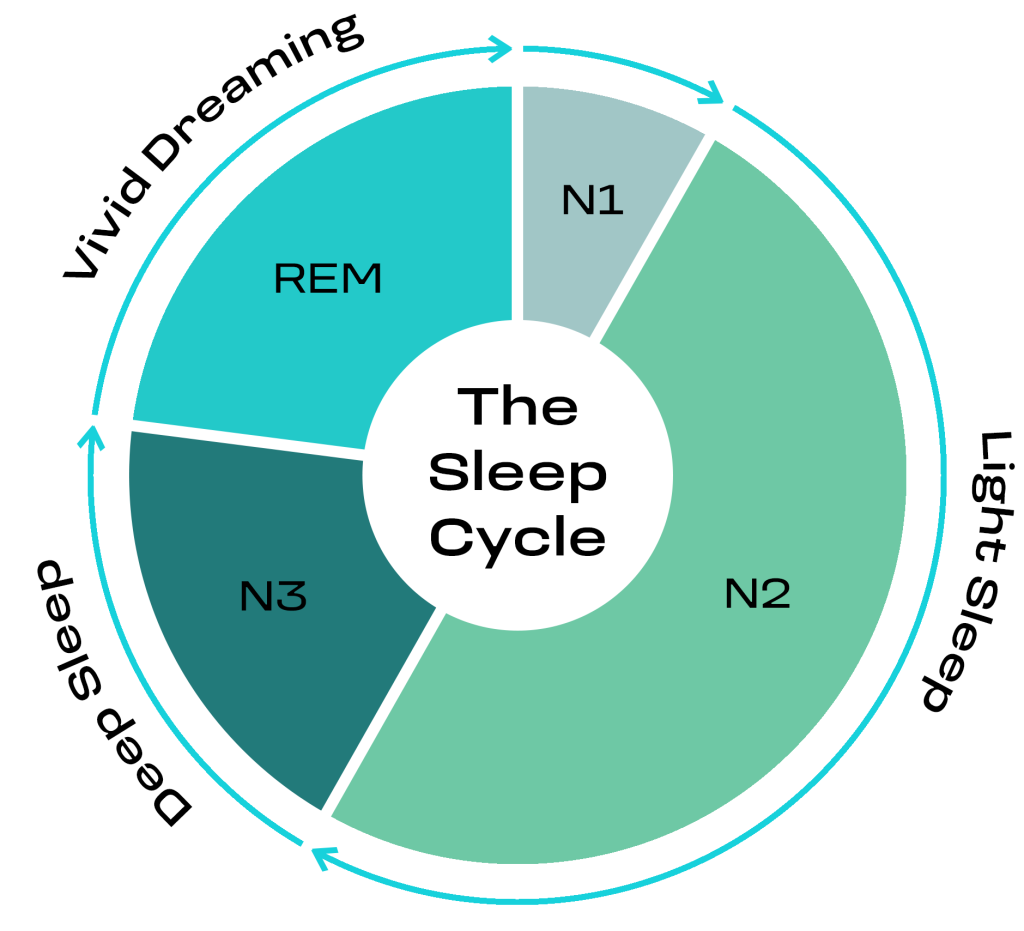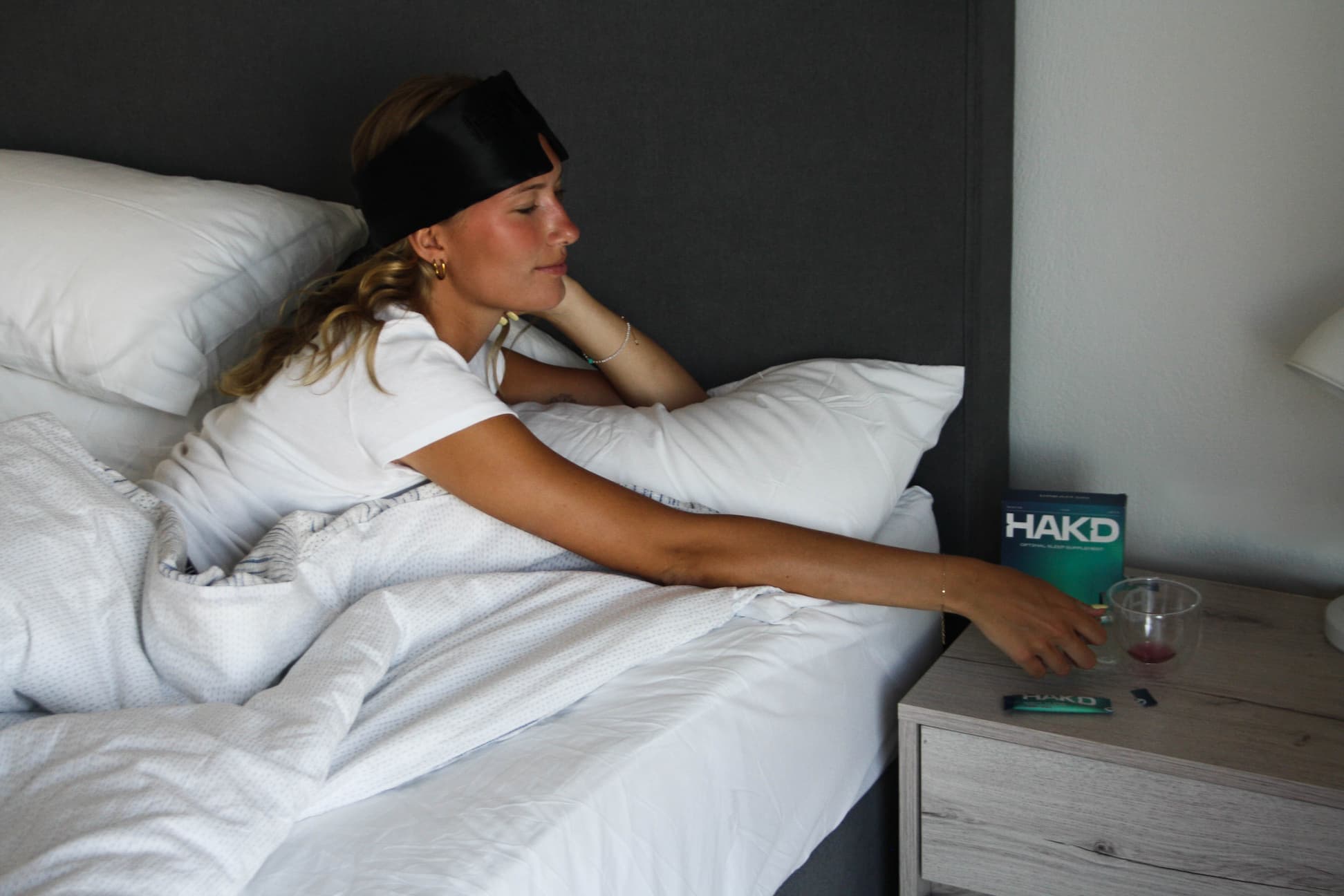Ever wondered why you still feel tired even after a full night’s sleep? The answer might lie in your sleep cycles.
Sleep isn’t one continuous state – it’s made up of distinct phases your body cycles through during the night. These sleep stages play a vital role in everything from brain health to physical recovery (1)(5). Many people experience poor sleep simply because they don’t understand how these cycles work or how to support them.
In this article, we’ll break down the science of sleep cycles, why they matter, and how you can optimise your sleep, naturally and effectively, with help from Night Blend.
What Are Sleep Cycles?
Sleep cycles are repeating patterns your brain and body move through during the night. Each cycle contains different stages of sleep that support physical recovery, brain function, memory, and emotional regulation. Moving through these cycles smoothly and completely is essential for waking up feeling rested and restored.
Sleep is not a uniform state but comprises multiple stages that cycle throughout the night. A complete sleep cycle lasts approximately 90 to 120 minutes and is made up of two easily distinguishable neurophysiological states: rapid eye movement (REM) and non-rapid eye movement (NREM) (3).
A typical night includes four to six of these cycles, with each containing two key phases:
- Non-Rapid Eye Movement (NREM) sleep
- Rapid Eye Movement (REM) sleep

Light Sleep (NREM Stage 1–2): The Starting Point for Restorative Sleep
Light sleep is the first stage where your body begins its transition from wakefulness into deeper rest.
During this stage, your muscles begin to relax, your heart rate slows, and your core temperature drops, signalling to your body that it’s time for sleep (2).
Why Light Sleep Matters:
- Prepares the body for deep and REM sleep
- Regulates breathing, heart rate, and temperature
- Supports overall sleep efficiency and restfulness
Without enough light sleep, transitioning into deep and REM sleep becomes difficult, leading to grogginess and poor recovery, even after a full night’s rest (2).
Deep Sleep (NREM Stage 3): Where Physical Recovery Takes Place
Also known as slow-wave sleep, this phase is essential for body repair and immune system function (4). During this stage, your body releases growth hormones, repairs muscle and tissue, and recharges your energy.
But deep sleep isn’t just about the body – it’s critical for the brain too. This stage plays a key role in memory consolidation, helping you process and retain new information (6). Whether you’re physically active, recovering from illness, or need sharp mental focus, deep sleep is when your body and brain do their most important work.

Key Benefits of Deep Sleep:
- Supports muscle repair and tissue growth
- Boosts the production of immune-fighting proteins (cytokines) (4)
- Helps consolidate memory and learning (6)(7)
- Promotes cell regeneration and hormonal balance
Without enough deep sleep, your body and brain can’t recover effectively, leaving you sluggish, foggy, and under-recovered.
REM Sleep: The Brain’s Most Active Sleep Phase
REM (Rapid Eye Movement) sleep is the most mentally stimulating phase of your sleep cycle. It’s when your brain is highly active, processing emotions, memories, and information from the day (7)(8). It’s also when dreaming occurs.
Despite high brain activity, your body experiences muscle atonia, a form of temporary paralysis, preventing you from physically acting out your dreams.
REM sleep isn’t just about dreaming – it’s crucial for cognitive function and emotional regulation. It enhances problem-solving abilities, strengthens memory, and boosts creativity (7). Additionally, REM sleep plays a key role in maintaining mood stability, helping you process emotions and avoid irritability (8). Without enough REM sleep, you may feel mental fog, emotional imbalance, and difficulty staying focused.

Benefits of REM Sleep:
- Enhances problem-solving, learning, and emotional processing
- Boosts creativity and cognitive function
- Helps maintain mental clarity and mood stability
- Crucial for emotional resilience and memory retention
Since REM sleep occurs mostly in the second half of the night, cutting sleep short can reduce time spent in this vital stage, leaving you feeling mentally drained and emotionally unsettled the next day.
How Many Sleep Cycles Should You Get Per Night?
Most adults experience four to six sleep cycles per night, depending on total sleep duration. Because each cycle lasts roughly 90 to 120 minutes, getting fewer than seven hours of sleep often means cutting one or more cycles short.
This matters because deep sleep occurs more heavily in the earlier cycles, while REM sleep dominates the later ones. When sleep is shortened, REM sleep is usually sacrificed first – which can impact mood, focus, creativity, and emotional resilience the next day.
Rather than aiming for a specific number of cycles, the goal should be allowing your body enough uninterrupted time to complete full cycles naturally. Consistency and sleep quality matter just as much as total hours.
Why Balanced Sleep Cycles Matter for Optimal Health
Each sleep stage plays a distinct role, but it’s the balance between them that really makes the difference. If any stage is shortened, whether from stress or disruptions, it can result in:
- Incomplete recovery
- Poor mental focus
- Emotional imbalance
- Weakened immunity
Moving through complete sleep cycles multiple times per night is essential for waking up refreshed, clear-headed, and energised (7).
How to Optimise Your Sleep Cycles
Now that you understand the basics, let’s talk about how you can enhance your sleep quality.
1. Maintain a Consistent Sleep Schedule
Go to bed and wake up at the same time daily – even on weekends. This helps regulate your circadian rhythm, allowing smoother sleep cycle transitions (2).
2. Create a Sleep-Friendly Environment
Make your bedroom cool, dark, and quiet. Use blackout curtains, a white noise machine, or a sleep mask.

3. Reduce Blue Light Exposure
The blue light emitted by phones and laptops can disrupt melatonin production, a hormone crucial for sleep. Reducing screen exposure at least an hour before bed can help ease your body into a deeper, more restorative sleep.
4. Wind Down Before Bed
Engage in calming activities like reading or taking a warm bath. For extra support, Night Blend’s natural ingredients help reduce stress and support your body’s transition into restful sleep.
Support Your Sleep Cycles with HAKD HEALTH’s Night Blend
Understanding your sleep cycles is the first step. Supporting them is where Night Blend comes in.
Formulated with 15 clinically backed, all-natural ingredients, Night Blend works in harmony with your body to:
- Help you fall asleep faster
- Improve deep and REM sleep duration
- Reduce night wakings and stress
- Leave you feeling refreshed and clear-headed in the morning

Whether you’re an athlete, entrepreneur, or simply someone who values their sleep, Night Blend is your ally in achieving consistent, high-quality rest. No grogginess. No restless nights. Just deep, restorative sleep that fuels your day.
Take Control of Your Sleep Tonight
Your goals don’t wait. Neither should your sleep.
Upgrade your nights with science-backed sleep support from HAKD HEALTH.
References:
- (1) Alhola, P., & Polo-Kantola, P. (2007). Sleep deprivation: Impact on cognitive performance. Neuropsychiatric Disease and Treatment, 3(5), 553–567.
https://www.dovepress.com/sleep-deprivation-impact-on-cognitive-performance-peer-reviewed-fulltext-article-NDT - (2) National Institute of Neurological Disorders and Stroke. (n.d.). Brain Basics: Understanding Sleep. U.S. Department of Health and Human Services. Retrieved June 29, 2025.
https://www.ninds.nih.gov/health-information/public-education/brain-basics/brain-basics-understanding-sleep - (3) Le Bon, O. (2020). Relationships between REM and NREM in the NREM–REM sleep cycle: A review on competing concepts. Sleep Medicine, 70, 6–16.
https://www.sciencedirect.com/science/article/abs/pii/S1389945720300757 - (4) Besedovsky, L., Lange, T. & Born, J., (2012). Sleep and immune function. Pflugers Archiv – European Journal of Physiology, 463, pp.121–137. https://doi.org/10.1007/s00424-011-1044-0
- (5) Rasch, B. & Born, J., (2013). About sleep’s role in memory. Physiological Reviews, 93(2), pp.681–766. https://doi.org/10.1152/physrev.00032.2012
- (6) Walker, M.P. & Stickgold, R., (2006). Sleep, memory, and plasticity. Annual Review of Psychology, 57, pp.139–166. https://doi.org/10.1146/annurev.psych.56.091103.070307
- (7) Goldstein, A.N. & Walker, M.P., (2014). The role of sleep in emotional brain function. Annual Review of Clinical Psychology, 10, pp.679–708. https://doi.org/10.1146/annurev-clinpsy-032813-153716
- (8) Stickgold, R., (2005). Sleep-dependent memory consolidation. Nature, 437(7063), pp.1272–1278. https://doi.org/10.1038/nature04286



